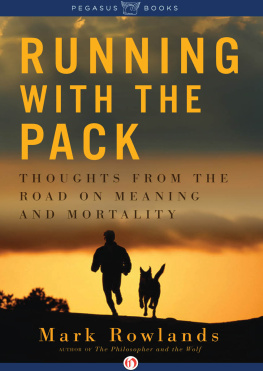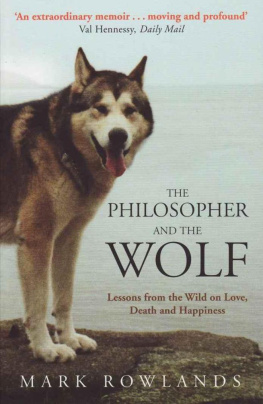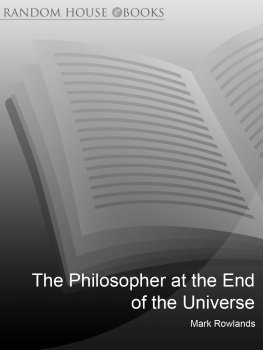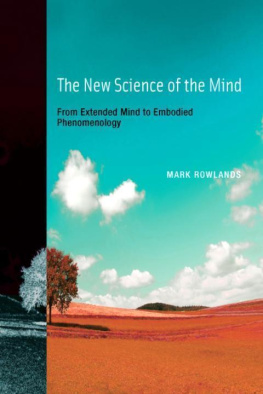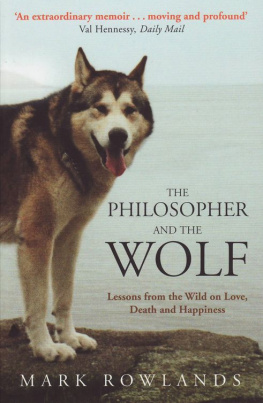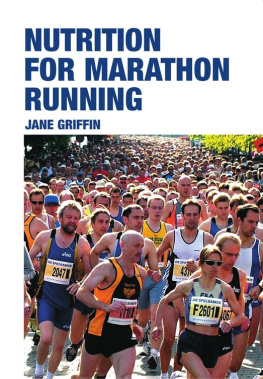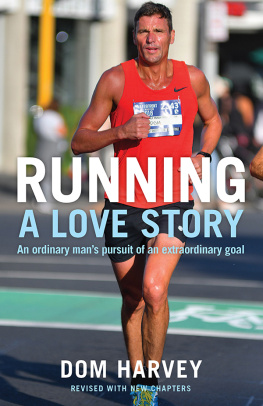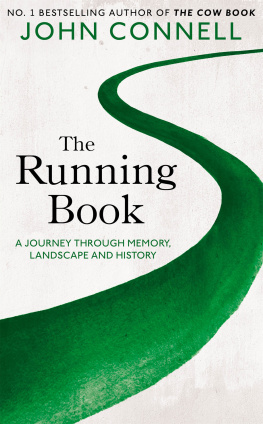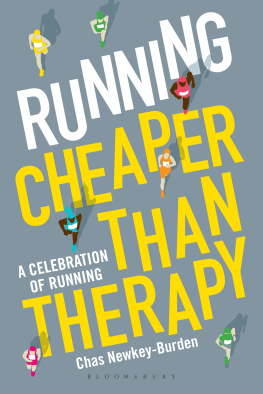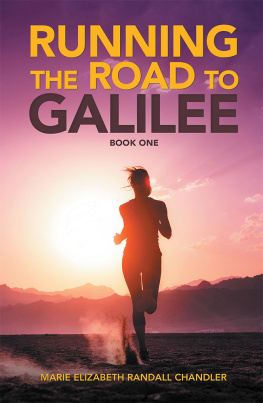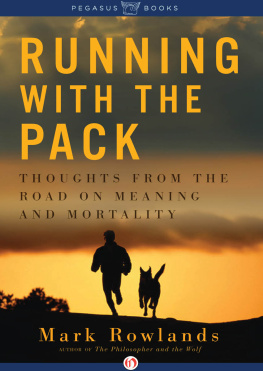RUNNING
WITH THE PACK
THOUGHTS FROM THE ROAD
ON MEANING AND MORTALITY
MARK ROWLANDS

PEGASUS BOOKS
NEW YORK LONDON
This book is dedicated to the memory of
my father, Peter Rowlands.
The long run is over but your footsteps echo still.
Contents
Foreword:
Running and Remembering
What is running? When a human being runs in the recreational sense in which tens of millions of human beings do, in fact, run what is the meaning or significance of this? One might think that the answer depends on the human being in question. Different people run for different reasons: some because they enjoy it, some because it makes them feel good, look good, because it keeps them healthy, happy, even alive. Some run for company, others to relieve the stress of everyday life. Some like to push themselves, test their limits; others like to compare their limits with the limits of others. It seems obvious that the significance of running varies from one person to another, because this significance simply amounts to the reasons a person has for running.
Nevertheless, it is currently popular to think that running has a meaning or significance not simply for individual human beings but for humans as a whole. This significance, many think, is grounded in the role running played in our evolutionary past and so in making us all of us what we are today. Some think, and they may be right, that we are simians that were born to run designed by millions of years of random mutation and natural selection to be running apes. We ran so that we could hunt, so that we could eat animals and not just plants. And, as Harvard anthropologist Richard Wrangham and others have argued, the resulting increase in protein in our diet played at least some role in the significant expansions our brains underwent during this time. It may not have been the driving force behind this encephalization, but without this increase in protein it could not have happened. Running, in other words, removed an important constraint on our development as a species. Others have postulated an even closer connection between our ancestral running and our impressive contemporary cognitive abilities. Our ancestors hunting strategy was based not on speed but endurance on the ability to keep track of a single animal, even if it was a member of a large herd, and track it mile after mile, keep up the pressure on it, to force it to keep running until it eventually died of overheating. Bernd Heinrich, a biologist at the University of Vermont, has argued that this necessity of focusing on one animal to the exclusion of all others, keeping that attention focused as the animal disappears towards the horizon, and maintaining it during the hours or even days to come, was the foundation of all our cognitive powers.
I think these stories, like many of the stories we tell about ourselves, are important not so much because of what they say but what they show. In saying this, I do not mean to suggest that the stories are necessarily false. On the contrary, I think there are important elements of truth in them. But an element of truth mistaken for a whole truth is sometimes more damaging than a lie. These evolutionary explanations of the significance of running attempt to account for this significance in terms of the usefulness that running has for the species Homo sapiens. There is nothing wrong with this: that is the way evolutionary explanations do and must work. But implicit in this and this is what the stories show is the assignation to running of value of a certain sort. Running is valuable because of what it does. Running is valuable because of other things it has brought us.
The assignation of this sort of value is reiterated at the level of the individual when we explain the significance of running in terms of the reasons people have for running. Individual people run, it is assumed, because it is useful for them to do so, in one way or another. Philosophers often refer to this value that derives from usefulness as instrumental value. Something has instrumental value when it has value as an instrument as a means to an end. Money has instrumental value: its value lies in the value of the things it can buy you. Medicine has instrumental value: its value lies in the value of the health to which it can restore you. When something has merely instrumental value, it does not have value in itself its value always lies elsewhere, in something else. It is this other thing that is the real locus of value.
Running does have instrumental value. But the error implicit in both accounts of running, individual and evolutionary an error that is perhaps great enough to be considered a monstrous historical lie is to suppose that this is the only value running has. It is not it is not even the primary value running has.
We live, in certain respects, in a monstrous age. This instrumentalist way of thinking about running is a reflection of the narrowly utilitarian era in which we have grown up: a time where everything must have a use must be good for something. In his seminal essay, The Question Concerning Technology, Martin Heidegger, perhaps the most important philosopher of the twentieth century, argued that implicit in the modern age is what he called a Gestell an enframing. That is, the modern age embodies a way of seeing or understanding the world around us and, as such, precludes other ways of seeing this world. The modern age is by no means unique in this regard: all the ages of humans have their defining Gestell. The characteristic of the modern age is a Gestell of a singularly instrumental or utilitarian form. In the Gestell of the modern world, everything is reduced to a resource of some or other sort. We encounter and understand things only in terms of their use broadly speaking, in terms of what they might do for us, whether for good or ill and we fail to even understand that there might be anything else of value to them. Even the world of nature is now described as a collection of natural resources. Heidegger, with his characteristic penchant for ungrammaticality, described this instrumentalizing tendency of modern thought as a darkened of the world. Reality itself is understood in narrowly technological terms.
Perhaps it is too strong to say that we have become constitutionally unable to think of value in any other terms than as a function of use. But we do find it difficult. Certainly, that is the way the activity of running is typically justified, both to oneself and others. One runs, so one says, to stay healthy, to stay thin, to relax, to stay alive. The implicit assumption in these answers is that if running is a legitimate way of spending ones time, then it must be good for something: that is, it must be useful in some way. That running may have a value that is independent of what it can do for us that it might have a value that cannot be understood in instrumental terms is an idea we find difficult to even understand. I say this from experience. I had to overcome many years of confusion, decades in fact, before I understood this.
I will spend much time in this book describing the experience of running conducting, as philosophers sometimes put it, a phenomenological investigation. I do not do this just for the sake of it, or because I enjoy it in fact I find it a difficult, exacting, often wearying thing to do. Rather, I describe the experience of running because, I shall argue, it is the experience of a kind of value that is quite different value that is not instrumental, not a function of usefulness. And in this value one can discern, at least in broad outline, something that is important in life. In this book, I shall defend a claim that many, I think most, will find strange. It is true that running has multifarious forms of instrumental value. However, at its purest and its best, running has an entirely different sort of value. This is sometimes known as intrinsic or inherent value. To say that something has intrinsic value is to say that it is valuable for what it is in itself, and not because of anything else it might allow one to get or possess. Running, I shall argue, is intrinsically valuable. And so when one runs, and does this for the right reason, one is in contact with intrinsic value in life.

